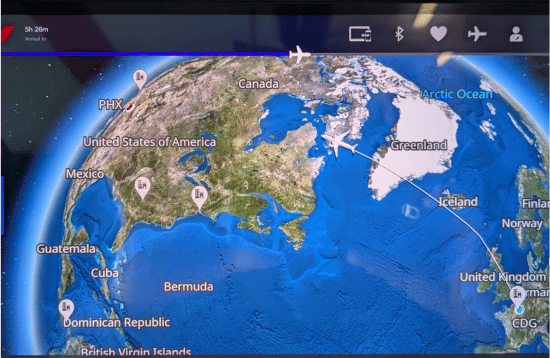Why Jet Lag Hits Cruisers Hard
Jet lag can put a damper on your vacation before it even begins.
Unlike a land trip where you might slowly adjust, cruises often have packed schedules right away—excursions, dinners, shows—so showing up rested makes a big difference.
Understand What Jet Lag Really Is
Jet lag happens when your body clock doesn’t match the local time.
Crossing multiple time zones confuses your natural rhythm, leaving you groggy, wide awake at 2 a.m., or ready for a nap right in the middle of sail away.
Start Adjusting Before You Go
A few days before your cruise, try shifting your bedtime and wake-up times closer to your destination’s schedule.
Even moving your routine by an hour helps ease the shock.

Stay Hydrated and Skip the Booze (for Now)
Air travel dehydrates you fast. Drink plenty of water before, during, and after your flight.
Save the cocktails for the sail-away party—alcohol makes jet lag worse.
Move Around During Your Flight
Stretching, walking the aisle, and even a few seated exercises keep circulation flowing and make you feel more awake upon landing.
Consider compression stockings to avoid blood clots.
Find other ways to stay healthy while traveling in our guide: What to do when you get sick on a cruise

Sleep Smart on the Plane
Use an eye mask, neck pillow, and noise-canceling headphones if you’re flying overnight. Avoid screens right before trying to sleep—blue light tricks your brain into staying awake.
Bring a few comfort items, really helps too!
I wasn’t sure about this neck pillow that I purchased on Amazon, but I was happy I had it.
I really loved it. All my other travel neck pillows are going to the thrift store!
You can get it here on my Amazon Store Front.
I may earn a small commission at no extra cost to you if you purchase through my link:
Travel Pillows for Airplanes, 360° Support Headrest Pillow with Eye Mask for Sleeping Long Flights
Get Sunlight as Soon as You Arrive
Nothing resets your body clock like natural light. Step outside once you reach your port city, even if it’s just for a short walk.

Why Pre-Cruise Stays Are a Game Changer
Arriving a day or two early in your departure city gives you breathing room to rest, recover, and avoid the panic of flight delays.
Plus, you can explore your embarkation city stress-free.
Pro Traveler Tip: If your flight is at the end of your trip, make sure to consider taking off an extra day once you return.
We were so grateful that we considered this.
There is no way I could have competently done my job the next day!
Panama Canal Tip: Choose the Right Direction
If you’re cruising the Panama Canal, think about where you live.
West Coast travelers usually adjust more easily if they start on the East Coast and finish closer to home.
East Coast travelers often prefer the opposite.
Transatlantic Cruises: Consider a Return Crossing
If you’ve got time and budget, check with a travel agent about return voyages.
Sailing back across the Atlantic lets your body adjust more gradually compared to flying home.
Find out more about a transatlantic cruise?
Read about our journey on Carnival Mardi Gras 14-Day Transatlantic Sailing to Spain.
Don’t Underestimate Trip Insurance
Delays, cancellations, or last-minute changes can happen.
Trip insurance not only protects your money but also gives peace of mind when you’re planning around long flights and major time changes.
Read more about Trip or Travel Insurance in our guide, Why Travel Insurance is Important for Cruisers
Light Meals, Not Heavy Feasts
Eating something light on arrival helps your body settle faster.
Avoid heavy, greasy meals that leave you sluggish.
Set Your Watch Early
Switch your phone and watch to your ship’s embarkation time zone once you’re on the plane.
Mentally adjusting helps your body follow suit.
Nap Strategically
Short power naps (20–30 minutes) can refresh you, but avoid long daytime naps that make adjusting harder.

Don’t Forget the Return Trip
Jet lag doesn’t end when your cruise does—it often hits again once you’re home.
If possible, schedule an extra day off before going back to work.
That cushion lets you rest, unpack, and ease back into your normal routine without feeling drained on your first day back.
✅Conclusion
Jet lag doesn’t have to steal a single minute of your cruise.
With a little planning—like adjusting your sleep, booking smartly, and considering cruise direction—you’ll step onboard ready to enjoy every cocktail, show, and port of call.
And remember, trip insurance is your safety net when travel doesn’t go as planned. Smooth sailing starts with smart prep—and don’t forget to allow yourself recovery time when you return home.
Do you have tips for avoiding jet lag during a cruise?
Let’s help each other. Drop your thoughts and tips in the comments!
FAQ’s:
1. How many days should I arrive before my cruise to beat jet lag?
Arriving 1–2 days early is usually enough to adjust and relax before boarding.
2. Does melatonin really help with jet lag?
Yes, many travelers find that melatonin helps reset their body clock, but check with your doctor first.
3. Should I avoid caffeine before my cruise?
Limit caffeine late in the day—it can make adjusting to new time zones harder.
4. Is it better to fly in the morning or evening?
Overnight flights help if you can sleep on planes. Otherwise, daytime flights may leave you less drained.
5. Do cruise lines offer help for jet-lagged passengers?
Not directly, but many ships have gyms, spas, and outdoor decks—great tools for recharging naturally.

